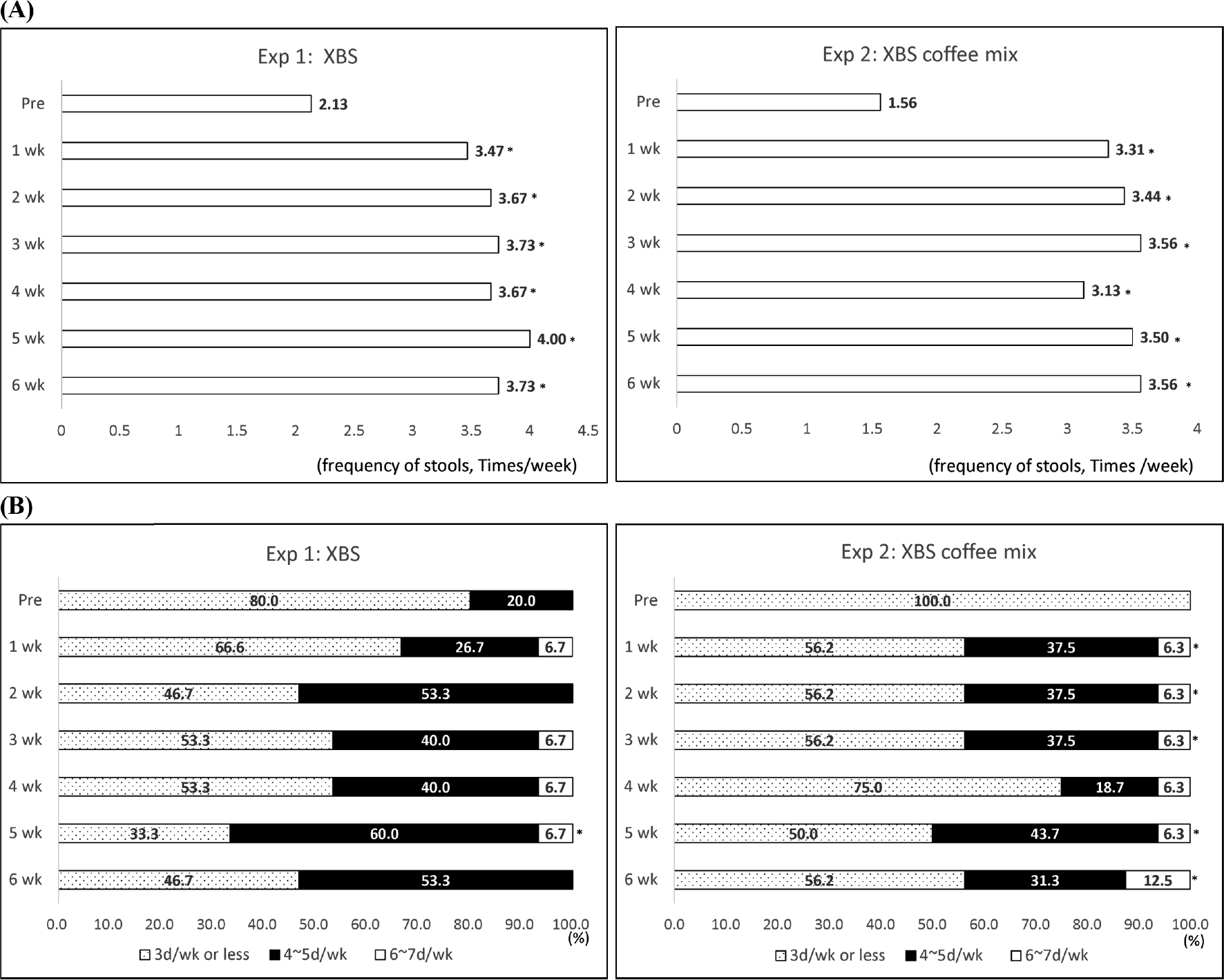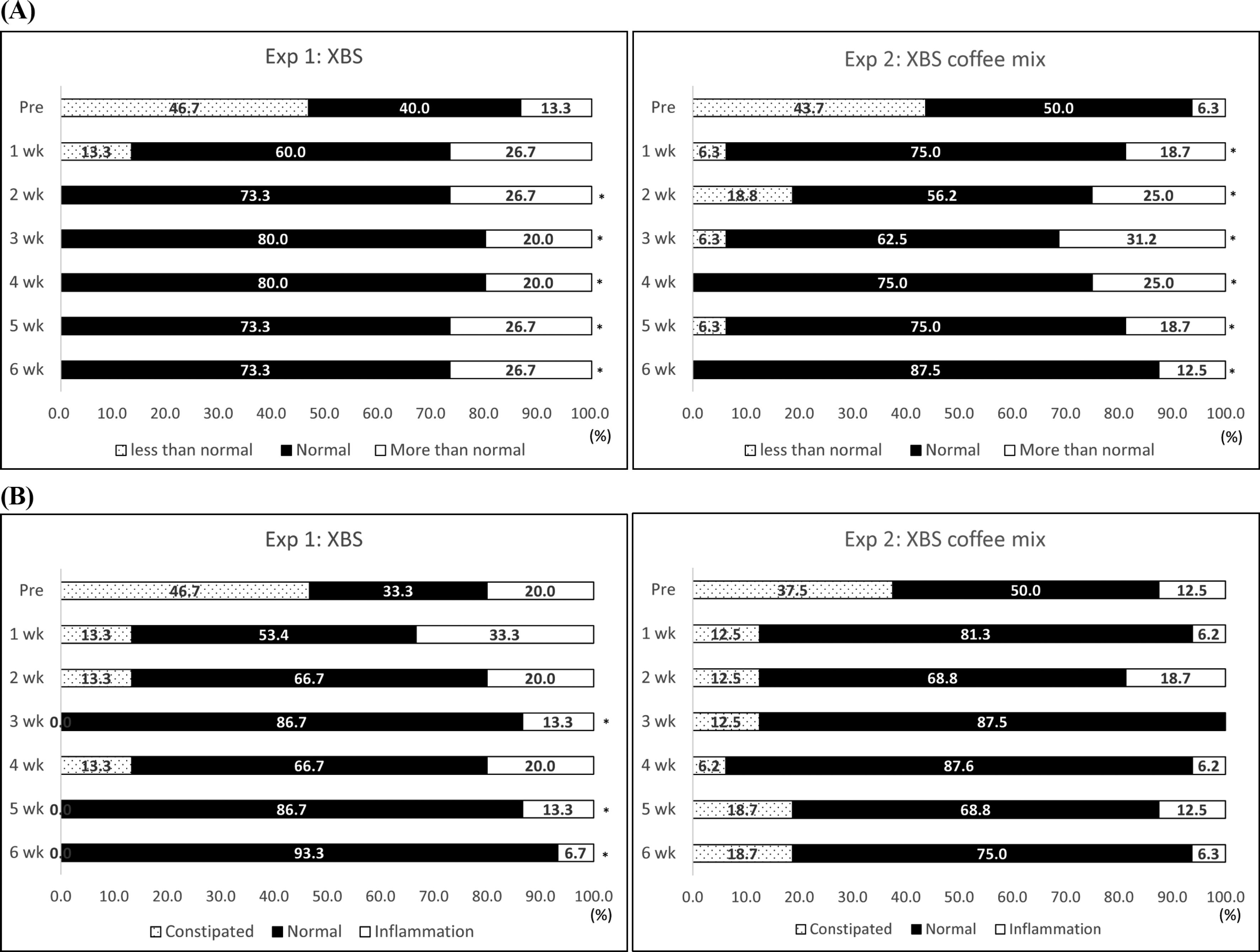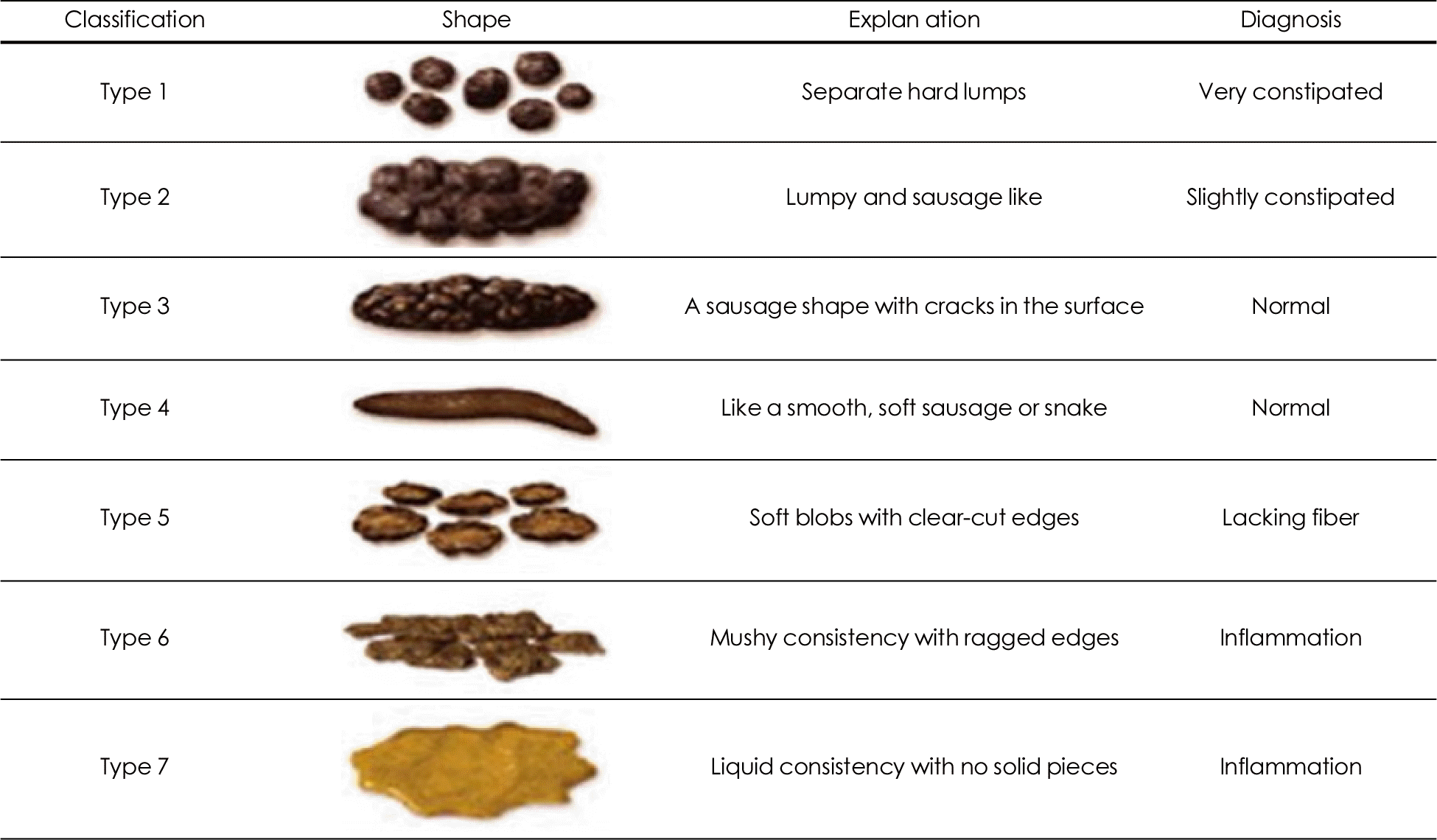Abstract
Purpose
The objective of the study was to investigate the effects of xylobiose-sugar mixture intake on defecation frequency and constipation symptoms in 31 young women with constipation. Methods: Thirty-one subjects were assigned to two groups, and subjects in each group were administered 10 g of a 7% xylobiose-sugar mixture (Experiment 1: XBS, n = 15) or 10 g of a 7% xylobiose-sugar mixture containing coffee mix (Experiment 2: XBS coffee mix, n = 16) twice per day for 6 weeks. During the study, clinical efficacy was assessed by a daily diary record. The subjects recorded their defecation frequency and fecal characteristics. Results: During pretreatment week, mean defecation frequency of XBS subjects was 2.13 times/week, whereas that of XBS coffee mix subjects was 1.56 times/week. The mean defecation frequencies of XBS and XBS coffee mix subjects increased significantly to 3.73 times/week (p < 0.05) and 3.56 times/week by week 6 (p < 0.05), respectively. After treatment with either XBS or XBS coffee mix, patients presented significant improvements in their amounts of stool, feelings of residual stool leftness, and abdominal pain symptoms (p < 0.05). The total constipation scoring system (CSS) for diagnosing constipation symptoms significantly decreased in the XBS group (10.53 score vs 7.22 score) and in the XBS coffee mix group (10.75 score vs 6.51 score) after 6 weeks. Improvement due to intake of 7% xylobiose-containing sugar seemed to last during the experimental period. Conclusion: The addition of approximately 7% xylobiose to commercially available sweeteners has been shown to improve constipation.
Go to : 
References
1. American College of Gastroenterology Chronic Constipation Task Force. An evidencebased approach to the management of chronic constipation in North America. Am J Gastroenterol. 2005; 100(Suppl 1):S1–S4. Suppl 1: S1-S4.
2. Johanson JF, Kralstein J. Chronic constipation: a survey of the patient perspective. Aliment Pharmacol Ther. 2007; 25(5):599–608.

3. Myung SJ, Lee TH, Huh KC, Choi SC, Sohn CI. Korean Society of Neurogastroenterology and Motility. Diagnosis of constipation: a systematic review. Korean J Gastroenterol. 2010; 55(5):316–324.

4. Talley NJ, Fleming KC, Evans JM, O'Keefe EA, Weaver AL, Zins-meister AR, Melton LJ 3rd. Constipation in an elderly community: a study of prevalence and potential risk factors. Am J Gastroenterol. 1996; 91(1):19–25.
5. Jung HS, Song YM, Lee JK, Kim YW, Han SH, Kang SC, Kim YE. Lifestyle factors related to constipation in working women. J Korean Acad Fam Med. 2002; 23(9):1124–1132.
6. Shin JE, Jung HK, Lee TH, Jo Y, Lee H, Song KH, Hong SN, Lim HC, Lee SJ, Chung SS, Lee JS, Rhee PL, Lee KJ, Choi SC, Shin ES. The Clinical Management Guideline Group under the Korean Society of Neurogastroenterology and Motility. Guidelines for the diagnosis and treatment of chronic functional constipation in Korea, 2015 revised edition. Korean J Med. 2016; 91(2):114–130.

7. Childs CE, Röytiö H, Alhoniemi E, Fekete AA, Forssten SD, Hud-jec N, Lim YN, Steger CJ, Yaqoob P, Tuohy KM, Rastall RA, Ouwehand AC, Gibson GR. Xylooligosaccharides alone or in synbiotic combination with Bifidobacterium animalis subsp. lactis induce bifidogenesis and modulate markers of immune function in healthy adults: a double-blind, placebocontrolled, randomised, factorial crossover study. Br J Nutr. 2014; 111(11):1945–1956.

8. Gibson GR, Probert HM, Loo JV, Rastall RA, Roberfroid MB. Dietary modulation of the human colonic microbiota: updating the concept of prebiotics. Nutr Res Rev. 2004; 17(2):259–275.

9. Hsu CK, Liao JW, Chung YC, Hsieh CP, Chan YC. Xylooligosaccharides and fructooligosaccharides affect the intestinal microbiota and precancerous colonic lesion development in rats. J Nutr. 2004; 134(6):1523–1528.

10. Rycroft CE, Jones MR, Gibson GR, Rastall RA. A comparative in vitro evaluation of the fermentation properties of prebiotic oligo-saccharides. J Appl Microbiol. 2001; 91(5):878–887.

12. Korea Food & Drug Administration. Xylooligosaccharide. Seoul: Korea Food & Drug Administration;2009.
13. Akpinar O, Erdogan K, Bostanci S. Enzymatic production of xylooligosaccharide from selected agricultural wastes. Food Bioprod Process. 2009; 87(2):145–151.

14. Okazaki M, Koda H, Izumi R, Fujikawa S, Matsumoto N. In vitro digestibility and in vivo utilization of xylobiose. J Jpn Soc Nutr Food Sci. 1991; 44(1):41–44.

15. Vázquez MJ, Alonso JL, Domínguez H, Parajó JC. Xylooligosaccharides: manufacture and applications. Trends Food Sci Technol. 2000; 11(11):387–393.

16. Bray GA, Nielsen SJ, Popkin BM. Consumption of high-fructose corn syrup in beverages may play a role in the epidemic of obesity. Am J Clin Nutr. 2004; 79(4):537–543.

17. Korea Health Industry Development Institute; Ministry of Food and Drug Safety (KR). Sugar database compilation for commonly consumed foods. Cheongju: Korea Health Industry Development Institute;2015.
18. Korea Consumer Agency. A report on the comparison of the component of coffee mixtures [Internet]. Seoul: Korea Consumer Agency;2014. [cited 2015 Oct 10]. Available from:. http://www.kca.go.kr/brd/m_32/view.do?seq=1634&multi_itm_seq=0. www.kca.go.kr/brd/m_32/view.do?seq=1634&multi_itm_seq=0.
19. Shin HL. Consumer attitude survey: beverage purchasing behaviors and preferences [dissertation]. Seoul: Sejong University;2010.
20. Ministry of Agriculture, Food and Rural Affairs (KR); Korea Agro-Fisheries and Food Trade Corporation. 2015 processed food subdivision market status: beverage market. Sejong: Ministry of Agriculture, Food and Rural Affairs;2015.
21. Ministry of Health and Welfare (KR). Adequate intake of sugars per day. Sejong: Ministry of Health and Welfare;2015.
23. Riegler G, Esposito I. Bristol scale stool form. A still valid help in medical practice and clinical research. Tech Coloproctol. 2001; 5(3):163–164.

24. Agachan F, Chen T, Pfeifer J, Reissman P, Wexner SD. A constipation scoring system to simplify evaluation and management of constipated patients. Dis Colon Rectum. 1996; 39(6):681–685.

25. Lee OS, Rhee IK. The production of xylooligosaccharides with microbial xylanase. Food Ind Nutr. 2001; 6(1):21–24.
26. Jeon JH, Kyung M, Jung S, Jo S, Chang MJ. Effect of xylooligo-saccharide-sugar mixture on defecation frequency and symptoms in young women with constipation: a randomized, double-blind, placebocontrolled trial. J Nutr Health. 2015; 48(1):19–29.

27. Jung SJ, Chae SW, Sohn HS, Kim SB, Rho JO, Baik SH, Kang MH, Kim GH, Kim MH, Kim HS, Park EJ, Heo YR, Cha YS. Actual status of constipation and life factors affecting constipation by diagnosis of Rome in female university students in Korea. Korean J Nutr. 2011; 44(5):428–442.

28. Preston DM, Lennard-Jones JE. Severe chronic constipation of young women: ‘idiopathic slow transit constipation'. Gut. 1986; 27(1):41–48.

29. Tateyama I, Hashii K, Johno I, Iino T, Hirai K, Suwa Y, Kiso Y. Effect of xylooligosaccharide intake on severe constipation in pregnant women. J Nutr Sci Vitaminol (Tokyo). 2005; 51(6):445–448.

30. Fujikawa S, Okazaki M, Matsumoto N, Koga K. Properties and production of xylooligosaccharide. J Jpn Soc Starch Sci. 1990; 37(2):69–77.

31. Kobayashi T, Okazaki M, Fujikawa S, Koga K. Effect of xylooligosaccharides on feces of men. J Agric Chem Soc Jpn. 1991; 65(11):1651–1653.

32. Na MH, Kim WK. Effects of xylooligosaccharide intake on fecal bifidobacteria, lactic acid and lipid metabolism in Korean young women. Korean J Nutr. 2007; 40(2):154–161.
33. Kondo J, Xiao JZ, Shirahata A, Baba M, Abe A, Ogawa K, Shimoda T. Modulatory effects of Bifidobacterium longum BB536 on defecation in elderly patients receiving enteral feeding. World J Gastroenterol. 2013; 19(14):2162–2170.
34. Campbell JM, Fahey GC Jr, Wolf BW. Selected indigestible oligo-saccharides affect large bowel mass, cecal and fecal short-chain fatty acids, pH and microflora in rats. J Nutr. 1997; 127(1):130–136.

35. Zoppi G, Cinquetti M, Luciano A, Benini A, Muner A, Bertazzoni Minelli E. The intestinal ecosystem in chronic functional constipation. Acta Paediatr. 1998; 87(8):836–841.

36. Dimidi E, Christodoulides S, Fragkos KC, Scott SM, Whelan K. The effect of probiotics on functional constipation in adults: a systematic review and metaanalysis of randomized controlled trials. Am J Clin Nutr. 2014; 100(4):1075–1084.

37. Crittenden R, Karppinen S, Ojanen S, Tenkanen M, Fagerström R, Mättö J, Saarela M, Fagerström R, Mattila-Sandholm T, Poutanen K. In vitro fermentation of cereal dietary fibre carbohydrates by probiotic and intestinal bacteria. J Sci Food Agric. 2002; 82(8):781–789.
38. Lee MR, Lee KA, Ly SY. Improving effects of fructooligosaccha-ride and isomaltooligosaccharide contained in sponge cakes on the constipation of female college students. J Korean Soc Food Sci Nutr. 2003; 32(4):621–626.
39. Lexicomp Inc. Magnesium oxide: drug information Lexicomp. Hudson (OH): Lexicomp Inc.;2014.
40. Wald A. Is chronic use of stimulant laxatives harmful to the colon? J Clin Gastroenterol. 2003; 36(5):386–389.

41. Okazaki M, Koda H, Izumi R, Fujikawa S, Matsumoto N. In vitro digestibility and in vivo Utilization of Xyloiose. J J Soc Nutr Food Sci. 1991; 44:41–44.
Go to : 
 | Fig. 1.The effects of XBS and XBS coffee mix intake on bowel movement frequencies for subjects (A) Weekly transition of the mean number of stools for subjects (B) Weekly transition of the number of days with defecation for subjects. XBS: xylobiose-sugar mixture group, XBS coffee mix: xylobiose-sugar mixture containing coffee mix group. ∗Significant difference from the pretreatment (p < 0.05) |
 | Fig. 2.The effects of XBS and XBS coffee mix intake on the stool states for subjects: (A) Weekly transitions in stool amounts, (B) Weekly transitions in stool types. Constipated: including type 1 and type 2 on Bristol stool chart (Type 1: Separate hard lumps, Type 2: Lumpy and sausage-like), Normal: including type 3, type 4, and type 5 on Bristol stool chart (Type 3: A sausage shape with cracks in the surface, Type 4: Like a smooth, soft sausage or snake, Type 5: Soft blobs with clear-cut edges), Inflammation: including type 6 and type 7 on Bristol stool chart (Type 6: Mushy consistency with ragged edges, Type 7: Liquid consistency with no solid pieces). XBS: xylobiose-sugar mixture group, XBS coffee mix: xylobiose-sugar mixture containing coffee mix group. ∗Significant difference from the pretreatment (p < 0.05) |
Table 2.
General characteristics and defecation state of pretreatment stages for subjects
Table 3.
The effect of XBS and XBS coffee mix intake on the abdominal states for subjects
Table 4.
The weekly increase in minutes spent in the lavatory per attempt
Table 5.
The effect of XBS and XBS coffee mix intake on the constipation scoring system (CSS) for subjects




 PDF
PDF ePub
ePub Citation
Citation Print
Print



 XML Download
XML Download